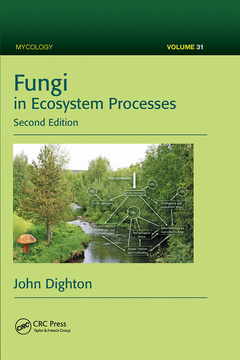Fungi in Ecosystem Processes (2nd Ed.) Mycology Series

This new edition of Fungi in Ecosystem Processes continues the unique approach of examining the roles of fungi from the perspective of ecosystem functions. It explores how fungi have adapted to survive within particular constraints, how they help to maintain homeostasis in ecosystems, how they facilitate resistance to perturbations, and how they influence the communities of other organisms.
Updated and revised, the second edition
- Expands the section on plant pathogens, invasive species, and insect?fungal interactions
- Provides more extensive coverage on insect?fungal interactions, including entomopathogens, the links between entomopathogens and endophytes, and symbiotic and mutualistic interactions
- Adds a new section on fungi in the built environment
- Presents new material on below-ground to above-ground interactions mediated through fungi, such as mycorrhizal signaling systems for herbivory defense
The book also includes expanded coverage of the role of fungi in suppressive soils, aquatic and marine fungi, modern methods of following food chains in fungal?invertebrate trophic interactions, and the physiology of nutrient uptake by mycorrhizae.
A necessary update and expansion to previous material, this book provides an essential reference on the current understanding of fungal roles in ecosystem processes. It also identifies directions for future study, including an emphasis on the need for further research on fungi in built environments.
Introduction. Making Nutrients Available for Primary Production. Role of Fungi in Promoting Primary Production. Role of Fungi in Reducing Primary Production. Fungi and Secondary Productivity. Fungi as Animal Pathogens: Negative Impacts on Faunal Productivity. Fungal Interactions with Pollutants and Climate Change. Fungi in the Built Environment.
John Dighton earned his MSc in ecology from Durham University, UK, and his PhD from London University, UK. After a brief spell of teaching high school, he worked for 15 years for the Institute of Terrestrial Ecology, Merlewood, UK, where he studied ectomycorrhizal fungi, forest soil ecology, forest nutrition, and the impacts of pollutants on fungi. He moved to the United States and started working with Rutgers University to run their Pinelands Field Station in the pine barrens of New Jersey. He has published more than 100 scientific papers; serves on the editorial boards of Soil Biology and Biochemistry, Fungal Biology, and Fungal Ecology; and has edited books on soil and mycology-related topics.
Date de parution : 06-2021
15.6x23.4 cm
Date de parution : 03-2016
Ouvrage de 378 p.
15.6x23.4 cm
Thème de Fungi in Ecosystem Processes :
Mots-clés :
Arbuscular Mycorrhizae; Ectomycorrhizal Fungi; Built environment; AMF; Ecosystem functions; Saprotrophic Fungi; Fungal-faunal interactions; Fungal Community; Grazing; Mycorrhizal Fungi; Mycology; Mycorrhizal Colonization; Plant and animal populations; Ericoid Mycorrhizae; Pollutants and climate change; Paxillus Involutus; Primary production; White Nose Syndrome; Secondary productivity; Nematophagous Fungi; Soil formation; Entomopathogenic Fungi; Collembolan Folsomia Candida; Mycorrhizal Community; Ectomycorrhizal Species; PGPR Isolate; Spore Density; Radiocesium Concentration; Fruit Bodies; Mycorrhizal Types; White Rot Fungus Trametes Versicolor; Arbuscular Mycorrhizal Spores; Aquatic Hyphomycetes; Fungal Endophytes; Mycorrhizal Association
